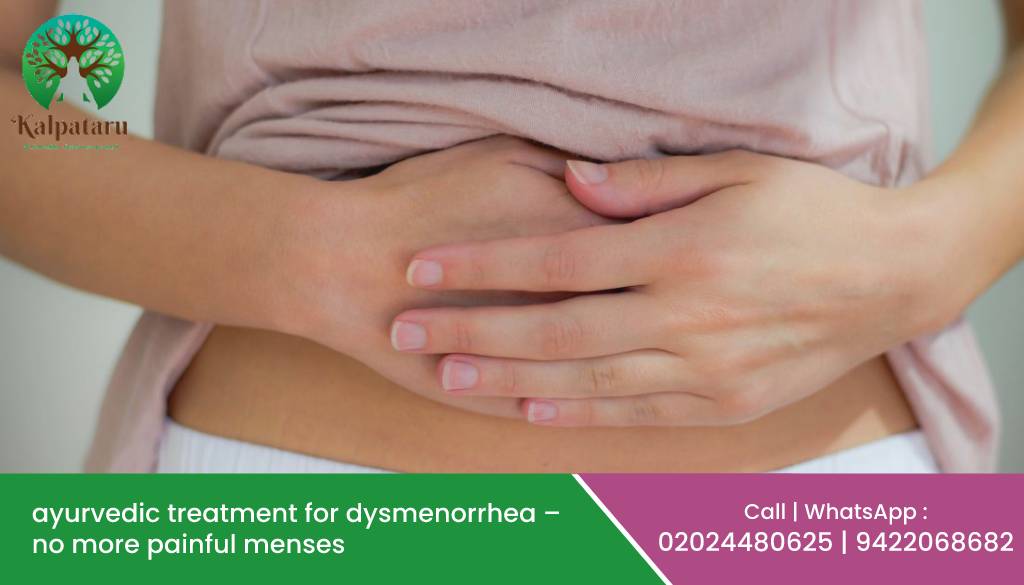Dysmenorrhea, or painful menstruation, is a common condition experienced by many women and girls during their menstrual cycle. It can range from mild discomfort to severe pain and can interfere with daily activities. While conventional medicine offers painkillers and hormonal treatments to manage the symptoms, Ayurveda, the ancient Indian system of medicine, offers a more natural approach to alleviate the symptoms of dysmenorrhea.
Ayurveda believes that dysmenorrhea is caused by an imbalance in the three doshas namely Vata, Pitta, and Kapha, which can be corrected by adopting a healthy lifestyle, following a balanced diet, and using natural remedies.
Here are some Ayurvedic treatment for dysmenorrhea:
Herbal remedies:
Ayurveda uses a variety of herbs to treat dysmenorrhea. Some of the commonly used herbs include:
Aloe vera, Ashoka, Lodhra, Manjistha, Sariva, Dashmoola, etc. These medicines correct hormonal imbalances. Also, these medicines control derrahnged Vat dosh.
Diet:
Eating a balanced diet can help prevent dysmenorrhea and reduce its symptoms. Here are some dietary recommendations:
- Increase your intake of fruits and vegetables: Fruits and vegetables are rich in antioxidants and nutrients that can help reduce inflammation and pain.
- Reduce your intake of processed foods: Processed foods are high in sugar, salt, and unhealthy fats that can increase inflammation and worsen the symptoms of dysmenorrhea.
- Include healthy fats in your diet: Healthy fats, such as those found in nuts, seeds, and fatty fish, can help reduce inflammation and pain.
- Avoid caffeine and alcohol: Caffeine and alcohol can increase inflammation and worsen the symptoms of dysmenorrhea.
Lifestyle Changes:
Ayurveda recommends adopting healthy lifestyle habits to prevent and manage dysmenorrhea. Here are some lifestyle changes you can make:
- Exercise regularly: Regular exercise can help improve blood flow and reduce inflammation in the body. Practicing yoga or going for a walk during your menstrual cycle can help alleviate the symptoms of dysmenorrhea.
- Practice relaxation techniques: Stress can worsen the symptoms of dysmenorrhea. Practicing relaxation techniques such as meditation, deep breathing, and yoga can help reduce stress and alleviate the symptoms of dysmenorrhea.
- Massage: Massaging the lower abdomen with warm oil can help reduce pain and inflammation in the uterus. Use sesame oil, almond oil, or coconut oil for the massage.
- Practice good sleep hygiene: Getting enough sleep and following a regular sleep schedule can help reduce stress and improve overall health.
Ayurvedic Therapies:
Ayurveda offers several therapies that can help alleviate the symptoms of dysmenorrhea. Some of these therapies include:
- Abhyanga: Abhyanga is an Ayurvedic massage technique that involves applying warm oil to the body. It can help reduce pain and inflammation in the body.
- Shirodhara: Shirodhara is an Ayurvedic therapy that involves pouring warm oil on the forehead.
- Basti: in this treatment around 50 ml of lukewarm oil is put inside your body through the anal canal. This process pacifies Vat dosh. According to the Ayurvedic perspective, there is no pain without the aggravation of Vat dosh. Giving basti treatment 5 days prior to M.C. cures dysmenorrhea.
For more information and treatment modalities watch our informative video
Conclusion:
Dysmenorrhea can be a debilitating condition for many women. While conventional medicine offers painkillers and hormonal treatments to manage the symptoms, Ayurveda offers a more natural approach to alleviate the symptoms of dysmenorrhea. By adopting a healthy lifestyle, following a balanced diet, and using natural remedies and therapies, women can alleviate the pain and discomfort associated with dysmenorrhea. However, it’s important to consult with a qualified Ayurvedic practitioner before starting any new treatment regimen, as individualized care is essential in Ayurveda. With the help of Ayurveda, women can find relief from dysmenorrhea and experience a healthier, happier menstrual cycle.
A casual approach towards dysmenorrhea is not a good practice as it can lead to many troublesome diseases in the future such as PCOD, obesity, infertility, etc.
Consult with Dr. Aparna Deshpande to get your dysmenorrhea cured.

